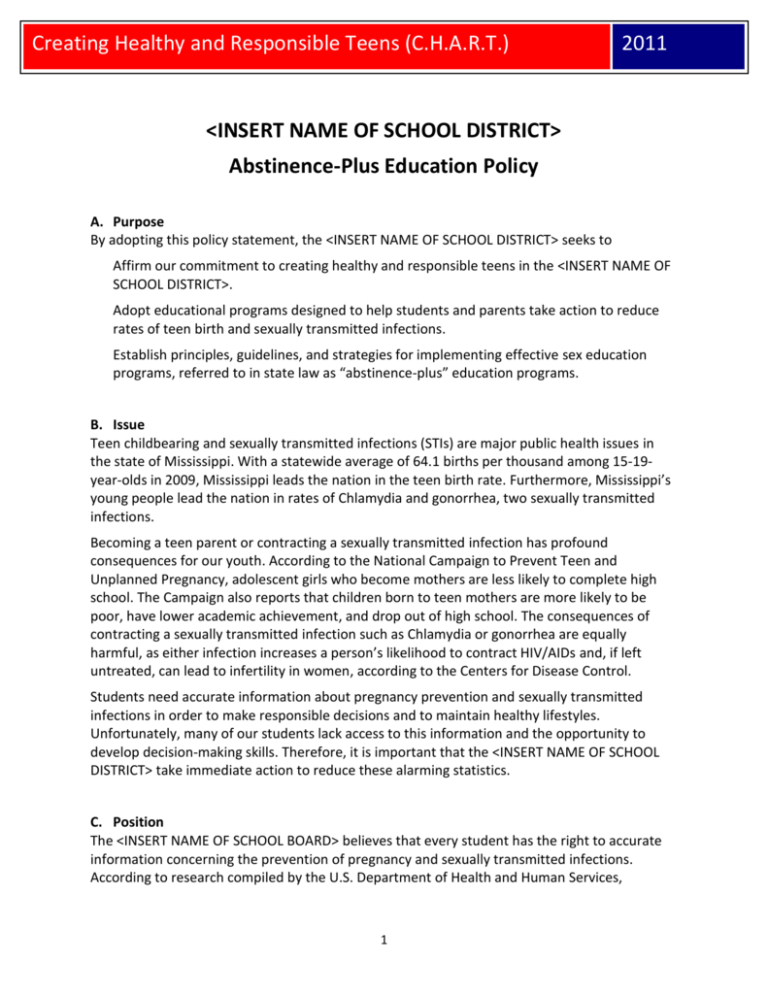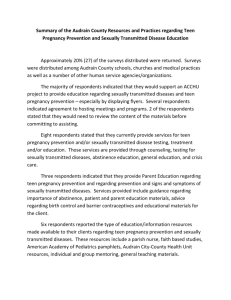
Creating Healthy and Responsible Teens (C.H.A.R.T.)
2011
<INSERT NAME OF SCHOOL DISTRICT>
Abstinence-Plus Education Policy
A. Purpose
By adopting this policy statement, the <INSERT NAME OF SCHOOL DISTRICT> seeks to
Affirm our commitment to creating healthy and responsible teens in the <INSERT NAME OF
SCHOOL DISTRICT>.
Adopt educational programs designed to help students and parents take action to reduce
rates of teen birth and sexually transmitted infections.
Establish principles, guidelines, and strategies for implementing effective sex education
programs, referred to in state law as “abstinence-plus” education programs.
B. Issue
Teen childbearing and sexually transmitted infections (STIs) are major public health issues in
the state of Mississippi. With a statewide average of 64.1 births per thousand among 15-19year-olds in 2009, Mississippi leads the nation in the teen birth rate. Furthermore, Mississippi’s
young people lead the nation in rates of Chlamydia and gonorrhea, two sexually transmitted
infections.
Becoming a teen parent or contracting a sexually transmitted infection has profound
consequences for our youth. According to the National Campaign to Prevent Teen and
Unplanned Pregnancy, adolescent girls who become mothers are less likely to complete high
school. The Campaign also reports that children born to teen mothers are more likely to be
poor, have lower academic achievement, and drop out of high school. The consequences of
contracting a sexually transmitted infection such as Chlamydia or gonorrhea are equally
harmful, as either infection increases a person’s likelihood to contract HIV/AIDs and, if left
untreated, can lead to infertility in women, according to the Centers for Disease Control.
Students need accurate information about pregnancy prevention and sexually transmitted
infections in order to make responsible decisions and to maintain healthy lifestyles.
Unfortunately, many of our students lack access to this information and the opportunity to
develop decision-making skills. Therefore, it is important that the <INSERT NAME OF SCHOOL
DISTRICT> take immediate action to reduce these alarming statistics.
C. Position
The <INSERT NAME OF SCHOOL BOARD> believes that every student has the right to accurate
information concerning the prevention of pregnancy and sexually transmitted infections.
According to research compiled by the U.S. Department of Health and Human Services,
1
Creating Healthy and Responsible Teens (C.H.A.R.T.)
2011
personal responsibility education—or “abstinence-plus”—programs which provide ageappropriate, evidence-based, and medically accurate information can delay the onset of sex,
reduce the frequency of sex, and/or reduce the number of sexual partners among teenagers.
Furthermore, state law requires school districts to adopt a sex education policy by June 30,
2012, and to implement a sex education curriculum by the start of the 2012-2013 school year.
As a result, the <INSERT NAME OF SCHOOL BOARD> is committed to adopting an abstinenceplus program with evidence of effectiveness for students similar to those in our population. We
are also committed to fostering community partnerships that educate both students and
parents about this important topic.
D. Desired Outcome
The goal of the <INSERT NAME OF SCHOOL DISTRICT>’s Abstinence-Plus Education Policy is to
reduce rates of teen birth and sexually transmitted infections.
E. Implementation Principles and Guidelines and Strategies
1. Principles and Guidelines: The principles and guidelines detailed below should guide the
implementation of this policy.
a. State statute—State statute requires school districts to adopt an abstinence-only-untilmarriage policy or an “abstinence-plus” policy. On this authority, the Board chooses to
adopt this “abstinence-plus” policy.
b. Definition of abstinence-plus education—First and foremost, abstinence-plus education
teaches the social, psychological, and health gains to be realized by abstaining from
sexual activity. However, although this abstinence-plus education promotes abstinence,
it acknowledges that some teenagers may become sexually active before marriage and
that most Americans, whether they abstain until marriage or not, will become sexually
active in their adulthood. Therefore, abstinence-plus education also provides instruction
about effective methods of contraception, including rates of effectiveness and failure
for “perfect use” and “typical use.” Finally, abstinence-plus education teaches students
how to behave more responsibly by emphasizing the development of skills such as goalsetting, negotiation, self-esteem, and decision-making.
c. Curriculum—The <INSERT NAME OF SCHOOL DISTRICT> shall adopt an age-appropriate,
evidence-based, medically accurate abstinence-plus curriculum on the list of curricula
recommended by the Mississippi State Department of Health, in accordance with the
U.S. Department of Health and Human Services. This curriculum, which shall also be
approved by the Mississippi Department of Education, will be implemented beginning in
the 2011-2012 school year. The curriculum will further conform to state law as outlined
below:
i) The curriculum should teach the definitional elements of abstinence-only-untilmarriage programs, which communicate
2
Creating Healthy and Responsible Teens (C.H.A.R.T.)
2011
1. The positive gains of abstaining from sexual activity, and the likely negative
effects of not abstaining;
2. The harmful consequences of out-of-wedlock children on the child, the parents,
and the community;
3. The irresponsible nature of unwanted sexual advances, how to reject them, and
how drugs/alcohol increases vulnerability;
4. That abstinence-until-marriage, and fidelity within marriage, is the only certain
way to avoid out-of-wedlock pregnancy and sexually transmitted infections;
5. The current state laws on sexual conduct, forcible and statutory rape, paternity
establishment, child support, and homosexual activity; and
6. That “a mutually faithful, monogamous relationship in the context of marriage is
the only appropriate setting for sexual intercourse.”
ii) The curriculum shall not provide information or demonstrations on how condoms
are correctly applied.
iii) The <INSERT NAME OF SCHOOL DISTRICT> shall not adopt a curriculum which
teaches that abortion may be used to prevent the birth of a baby.
d. Grades taught—Abstinence-plus education will be offered in each grade required by the
selected evidence-based program. Instruction must begin no later than the seventh
grade. All students must be given the opportunity to receive instruction in abstinenceplus education.
e. Instructor of record—The curriculum will be taught by licensed health educators, family
and consumer science educators, or educators with a health education and/or science
endorsement presently employed by the <INSERT NAME OF SCHOOL DISTRICT>.
f. Training—All educators assigned to teach abstinence-plus education must receive
training on the curriculum adopted by the district and approved by the Mississippi
Department of Education. Teachers and other school staff attending training sessions
provided by the Mississippi State Department of Health’s Bureau of Community and
School Health will receive continuing education (CEU) credits.
g. Parental consent—In compliance with Mississippi law, students are not required to
participate in abstinence-plus education. Moreover, the district shall provide to
parents/guardians no less than one week’s written notice of the abstinence-plus
education program’s commencement. This written notice must inform the
parents/guardians of their right to request the inclusion of their child into the program
and the manner by which parents/guardians may exercise this right. The notice must
also inform the parents/guardians of the right and the process to review the approved
curriculum and materials. A parent/guardian’s refusal to allow their child to participate
in the abstinence-plus education program shall be without detriment to the student.
However, every effort shall be made to ensure parents understand their right to request
that their child participate in the program.
3
Creating Healthy and Responsible Teens (C.H.A.R.T.)
2011
i) Nothing in this section shall be interpreted to allow parents/guardians to opt
students out of instruction in traditional courses in biological science.
h. Alternative coursework—Students not participating in the district’s abstinence-plus
program must complete alternative coursework for the duration of the program. This
alternative coursework may include instruction in other health-related topics.
i.
Single-sex classes—In accordance with requirements in state law, boys and girls shall be
separated according to gender into different classrooms for the sex education
curriculum.
2. Strategies: The following mandatory strategies shall be employed to ensure this policy is
implemented with fidelity.
a. Program Coordinator—The Superintendent will direct a currently employed district staff
member to coordinate the implementation of the program and ensure program
continuity as required by the Mississippi Department of Education. The Coordinator will
also organize the following training activities:
i) Training for instructional staff as discussed in the principles and guidelines; and
ii) Training for non-instructional staff such as principals, counselors, administrators,
and interested community activists designed to assist participants in creating
community partnerships, implementing the program within their respective schools,
and handling public relations.
b. Public awareness—The district shall conduct the following activities to raise the public’s
awareness and understanding of the program:
i) Publication and dissemination of the district policy as well as general information
about abstinence-plus education and the approved curriculum, including where
parents may review the curriculum materials; and
ii) One or more community-wide town hall meetings to educate community members
on the program and its potential long-term effect on reducing the number of
students affected by teen birth and sexually transmitted infections.
F. REVIEW AND REPORTING
The Superintendent will provide the <INSERT NAME OF SCHOOL BOARD> with an annual report
on the outcomes of the abstinence-plus education program. If funding is available, this report
shall include quantitative as well as qualitative analysis of the program and shall include the
perspective of students, teachers, and parents/guardians.
This policy will be reviewed on an on-going basis in accordance with the Board’s policy review
process.
LEGAL REF.: Miss. Code Ann. §37-13-171, §37-13-173, §37-13-175
DATE: <INSERT DATE ADOPTED>
4







